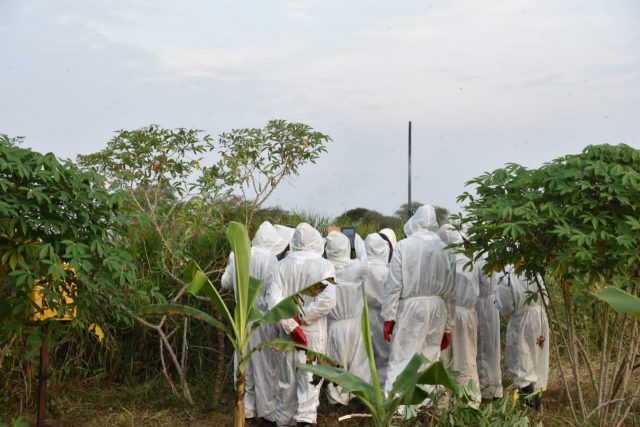
Kampala, Uganda | Julius Businge | A total of 4,000 farmers/people will benefit from Pearl Dairy Farms Limited’s new line of business, honey keeping/processing in the next four years.
The company will plant a total of 20, 000 beehives at the farmers’ farms in addition to training them (farmers) on how to go about the trade, according to Micheal Van den Berg, the head of dairy and apiculture development at Pearl Diary.
The company will collect the honey, process it, package it and export it to Europe. Uganda has a 5,000 ton export permit/quota of honey to the European market per year, which is yet to be exploited.
Executives at Pearl Dairy Farms Ltd have said that a honey processing plant will be ready at the end of next month to facilitate production and exports.
It is being constructed in Mbarara, South Western Uganda, and is 90% complete.
Van den Berg, told reporters at the end of last week that the factory has a production capacity of 20tons per day.
It will be fully automated and have about 10 people to operate it.
“We see a return on it (factory), which is why we are investing in it,” he said.
Pearl Dairy turned to this project in April last year after Kenya authorities blocked the entry of dairy products from Uganda. It is expected to supplement on farmers income that has negatively been impacted by the Kenyan ban.
Van de Berg said the project, currently at phase one, will be fully commercial, and that a total of 200 farmers have so far been recruited to man 1,000 beehives.
There are two seasons of harvesting honey in a year. A farmer will earn Shs160, 000 from each beehive per year at peak, according to Van de Berg.
In a bid to make the project a success, the company has hired a consultant, Ernest Simeoni, from the Kenyan based firm, African Beekeepers Ltd to train farmers and extension workers in apiculture (beekeeping) and related practices.
Simeoni has 26 years’ experience in this field. He said, the farmer will need education and good quality equipment to benefit from the project.
“We are dealing with new people; people who have never dealt with this,” Simeoni said, “I see people are prepared to learn and we are going to coach them to do this.”
The problem, he said, in Uganda and Africa, people do not do beekeeping but instead do honey hunting “and this is causing a lot of issues including losing bees because the old people who used to do honey hunting, knew how to do it…the new people are only interested in making money.”
About 70% of the project beneficiaries will be women, according to Van de Berg.
 The Independent Uganda: You get the Truth we Pay the Price
The Independent Uganda: You get the Truth we Pay the Price



